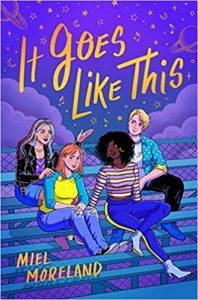It Goes Like This is a story about friendship, second chances, and not giving up on the people who care about you. The story follows the former members of Moonlight Overthrow, a band of teenagers who split up a year and a half before the events of the novel. Celeste and Gina, two of the members, have built new solo careers for themselves in music and acting. Steph has disappeared from the public eye and cut off all communication with their former friends. And Eva is a college student, writing music and closely following the fandom of her former band on Tumblr on a secret account. When dire circumstances cause the band to come back together for a one-time charity concert, the former friends are forced to confront their past together and decide if they’re really better off without each other.
Each of the four members of Moonlight Overthrow are featured and are fully fledged, three-dimensional characters. However, Eva is the clear primary protagonist. The core of a story is a pair of questions, both centered around her. Will the band get back together, now that they’ve seen what their lives are like without each other? And will Eva and her ex, Celeste, rekindle the relationship that they were in for much of their time in the band? As the story goes on, it becomes clear that the answer to both questions depends on Eva, as she was the person most hurt by the end of both the band and her relationship.
Eva’s journey is deeply sympathetic. Through a series of flashbacks in the story, we see how deeply hurt she was by the band’s breaking up, the only person who wanted to stay together. How abandoned and lost she felt in the immediate aftermath. We also see her fear over seeing her best friends back together, and her ex-girlfriend, whom she still has strong feelings for, reaching back out. These people hurt her without warning before, and it’s hard for her to decide to trust them again, no matter how much she wants to.
Celeste’s story revolves around Eva. A successful solo performer now, Celeste still finds herself writing songs about her ex, even more than a year after their unceremonious breakup. Now, finally with the chance to make things right, she’s desperate to show Eva that she’s realized that breaking her heart is the biggest mistake of her life. Her coming to terms with the ways that she has hurt and continues to hurt Eva is a compelling part of the story.
Gina’s story is more introspective than the previous character’s. Her primary conflict of the novel revolves around how she, and the world at large, perceive her. Throughout the story, she refers to herself as the next Rihanna, or the next Beyonce, comparing herself to other successful Black performers. As the story goes on, she’s forced to confront the ways she’s comparing herself to others, and the ways that has caused her to push away those close to her.
Finally, Steph’s story is much smaller in many ways than the other characters. After Moonlight Overthrow broke up, Steph disappeared, returning to the band’s home of Duluth and cutting off contact. Their conflicts within the story primarily revolve around the fears around the effects of being a nonbinary person in what was most well known as a “girl band”, and around the effect that being in a band had on their family, who also feature prominently in the story.
Miel Moreland has a talent for writing sapphic romance, and this story is no exception. The “will they, won’t they” tension between Eva and Celeste is palpable throughout the story, especially with the commentary from their friends and flashbacks to their time together. Celeste grows to understand the ways in which their breakup hurt Eva, and takes actions to rebuild her trust. The regrowing friendship between them and questions about more make a compelling romantic core for the story.
Gina also has a sapphic romance of her own, though it is less relevant through the story. Her girl back home serves less as a romantic subplot and more of a chance for Gina to open up to her old friends and show her willingness to rekindle the friendship that has long since died out.
The real representational win though is Steph and their identity. Cleverly, though Steph’s identity isn’t revealed to the characters until the end of the first act and there are several flashbacks throughout the story, these parts of the book are written so that rather than either misgender the character or have a character use they/them pronouns they wouldn’t know to use, pronouns are avoided altogether. Not gendering Steph until the characters are aware of their gender identity makes the world feel more natural, without resorting to misgendering the character.
And Steph’s identity does form an undercurrent through the story. One of the primary reasons that they left the band was its identity as a “group of queer girls”. When their friends re-enter their life, Steph is unsure whether they have a place in this group, and their friend’s quick acceptance and willingness to defend them is a heartwarming piece of the story.
All in all, It Goes Like This is an excellent read. The story flows well and stays engaging, with multiple POVs and a few flashbacks helping to keep up the pace and stop things from feeling too slow. The story has some good thematic depth as well, though we can’t get into specifics there without spoiling the story. Rest assured, this is a story that stuck with me after I finished reading it, and even inspired a reread to see these characters I enjoyed so much again. You won’t regret your time with Moonlight Overthrow.


